
Guests
- Hossam Nasrorganizer with No Azure for Apartheid and a former Microsoft employee.
Microsoft says it has barred the Israeli military from using the company’s services to spy on millions of Palestinian civilian phone calls made each day in Gaza and the occupied West Bank and stored in Microsoft’s vast Azure cloud computing platform.
It’s an unprecedented victory for No Azure for Apartheid, a group of current and former Microsoft workers demanding an end to Microsoft’s work with the Israeli military.
We speak to Hossam Nasr, an organizer with No Azure for Apartheid and a former Microsoft employee who was fired last October after organizing a vigil outside the Microsoft headquarters for Palestinians killed by Israel’s military in Gaza.
Transcript
AMY GOODMAN: This is Democracy Now!, democracynow.org, The War and Peace Report. I’m Amy Goodman.
Microsoft has blocked Israel’s use of its technology for mass surveillance of Palestinians. This follows a protest campaign and investigations into how Microsoft let Israel’s military surveillance agency use its Azure cloud storage platform to store millions of phone calls collected from Palestinians in Gaza and the West Bank. The Guardian, +972 Magazine and Drop Site News have all published exposés on Microsoft’s work with the Israeli military.
This is Smith speaking in August in response to the mass protests at Microsoft offices.
BRAD SMITH: The vast majority of what Microsoft does for the Israeli military, the Israeli Defense Force, is protect the cybersecurity of the state of Israel. … Other activities, as well, that involve the use of Azure, for storage, for example, for processing of data. And that is what we are focused on getting to the bottom of.
AMY GOODMAN: That’s Microsoft President Brad Smith in August, after protesters with the No Azure for Apartheid launched an encampment at the company’s headquarters in Redmond, Washington.
HOSSAM NASR: We are bringing the movement to the heart of this campus, because this profiteering company is sitting on mounds of hundreds of thousands of Palestinian corpses.
AMY GOODMAN: That’s Hossam Nasr, an organizer with No Azure for Apartheid and a former Microsoft worker who was fired last October after organizing a vigil outside Microsoft headquarters for Palestinians killed by Israel’s military in Gaza. He joins us now from Seattle, Washington.
Hossam, thanks so much for being with us. Can you respond to Microsoft’s decision, and what exactly that decision does and doesn’t do?
HOSSAM NASR: Right, yeah. So, Microsoft yesterday made a pretty significant, unprecedented move, and a win for the campaign, when they became the first U.S. company, the first U.S. tech company, to withdraw some of the services that they’re providing for the Israeli military, when they withheld some of the cloud services, particularly storage and AI, that they were providing to Unit 8200, the Israeli spy agency, that was found — after evidence was found that it was being used for mass surveillance of Palestinians.
This move is unprecedented, and it’s a significant win, not only because Microsoft becomes the first U.S. company to do so, but also because it comes in a context in which we see the tech industry, in general, is sliding more and more into collaborating with fascism, with authoritarianism, with Zionism, with some of the most evil forces in the world. We saw recently how Google was found to have signed a $50 million deal with the Israeli government to promote Israeli talking points. We saw recently Uber invested in Israeli drone technology. And we see Palantir collaborating with ICE to facilitate deportations. So, for us, in this context, to claw back a sense of normalcy, a sense of morality from these tech companies, and for it to come from one of the most valuable companies on Earth, is vindicating to the organizing that we’re doing, and is a testament that we do not have to resign to the status quo. We do not have to resign to those people in power.
But at the same time, we have to be very sober about what this isn’t, right? This isn’t the historic complete severance of ties between Microsoft and the Israeli military that we had been campaigning for for the past two years and that over 2,100 Microsoft workers had signed a petition calling for. What this really does is it only stops a single unit in the Israeli military, which is Unit 8200, from using only some of the services that Microsoft provides. Unit 8200 might be the most intrusive unit that Microsoft collaborates with, but it’s probably not the most deadly. We know from reporting that Microsoft also sells technology directly to naval, air and ground military units in Israel. We also know that they even send workers to embed within those units, and they were described as behaving as if they were soldiers themselves.
So this is definitely not the end of our fight. And I think, for us, it’s also important to realize, like I said, it’s only a partial win. To use an analogy, and I’m not very good with metaphors, but if I was making knives, and I was selling you my knives, and I later find out and I see that you’re using these knives to kill children and gouge their eyes out, and I see evidence of you using my knives to do that, and then I only stop selling you one of my knives to only one of your limbs, that’s definitely not enough. And that’s what Microsoft has done with this announcement.
AMY GOODMAN: You know, it was very interesting to see Brad Smith in August, when you had the protest and the occupation of his office, the president of Microsoft, say, OK, they’re going to do a review. Is that when you were arrested? Were you arrested inside his office?
HOSSAM NASR: I was arrested twice last month, actually. So, I was arrested in his office, just probably an hour before he came on and had that press conference. I was also arrested a week prior, as well, when we launched the liberated zone encampment on Microsoft campus. And I was arrested then, as well. It was the — when you showed the clip earlier, that was on the first day of the encampment. And then we had — we came back the second day, and on the second day, we were also violently arrested.
AMY GOODMAN: What do you think made Brad Smith say they will start this review, and now today’s announcement? Did you ever end up talking to him? I mean, you worked for Microsoft.
HOSSAM NASR: I worked for Microsoft for three years. I never had the disprivilege of talking to Brad Smith.
But I will say that there is no doubt that the announcement today and the investigation that started in August, and even the first investigation that they launched and announced in May, were all a direct result of our organizing and our relentless activism around this issue. Microsoft, from the beginning, their strategy was to just ignore and silence our organizing. They tried repeatedly to ignore us for over a year of our organizing. And when our protests became unavoidable, especially after some of the more high-profile disruptions that we did, they were forced to come with the announcement that they made on Nakba Day, on May 15 this year, announcing the results of their first investigation, which was — basically said that they found no evidence of wrongdoing. They’ve investigated themselves and found no wrongdoing. That was mere days before our scheduled protest at Microsoft Build, which was one of its most high-profile conferences of the year. It was clearly an attempt for them to try to stop our protests.
I mean, that didn’t work, and especially when more news came out that directly refuted their claims on May 15, I think, again, they tried to preempt — preemptively tried to stop some of our protests by making this announcement that the investigation, the second investigation, was going to be started. And we launched — shortly after, we launched the liberated zone encampment. We occupied Brad Smith’s office. And less than a month later, Brad Smith comes out with this announcement. So, it’s very clear that the only reason that Microsoft ever even tried to make this investigation or take this significant step this week is because of our organizing and our activism.
AMY GOODMAN: One of the reporters who covered the mass protests in August at Microsoft’s headquarters in Redmond, Washington, was the editor of The Real News Network, Maximillian Alvarez. He shared a video of what happened after he was covering the protests.
MAXIMILLIAN ALVAREZ: So, I’m walking back to my car after covering the encampment and the police breaking up the encampment on Microsoft’s headquarters. And as I walk back to my car, I can literally hear one of these drones buzzing above my head right now.
AMY GOODMAN: So, that’s Maximillian Alvarez, the editor of The Real News Network, and he said he was being followed by drones. Hossam, do you know about this?
HOSSAM NASR: Yeah. I mean, unfortunately, it’s par for the course for how Microsoft has reacted to our protests. Funny enough, just in the same week that we occupied Brad Smith’s office, myself and a couple other former Microsoft workers, we went back to campus to simply table on public property away from Microsoft campus, and we were simply just handing out flyers to workers, and Microsoft security immediately started barricading the bridge that we were on. They sent, as far as I could count, at least eight security workers to follow us around. And they even sent the Redmond police. I saw at least three police cars, including a police van. I saw the drone homing above us, as well, simply for workers who are flyering on public property.
So, I think that really shows how scared they are of our organizing, how scared they are of our movement. And also, like I said, they have always been resorting to brute force, to repression, to silencing as a response to our organizing. And this isn’t new. This is to be expected. If we ever get to a point of challenging those in power, they will respond with repression. If anything, if we’re not facing repression, we’re not challenging them enough.
But as it stands, it’s never going to work. It hasn’t worked. They’ve done this in the past. They continue to do this, and we know they will do this in the future, as well. But every single time they’ve tried to fire our workers, they’ve tried to silence us, they’ve tried to intimidate us, our organizing has only gotten stronger, more loud, more bold, and we’ve continued our escalations. And now they’re trying a new strategy of trying to give us a little bone, hoping that they will shut us up. But we’ve been very clear from the beginning that the only way that we will stop our organizing is once all of our demands are met completely.
AMY GOODMAN: Can you explain how Azure works, what exactly it was used for? And again, he was saying that “we’re going to continue to work with the Israeli military on their cybersecurity.” But the distinction between that and what Azure was being used for?
HOSSAM NASR: Right. So, Azure is the umbrella term for all of Microsoft’s cloud and AI services. So, that includes storage. It includes compute power. It includes AI services, as well. And as we know, the Israeli military uses cloud services, in general, including Microsoft services, for a whole host of surveillance and targeting systems. So, there is a comprehensive surveillance system that’s set up in the West Bank, as well as Gaza, and they compile all this data, including, for example, phone calls, as we know from recent reporting. They store them on Microsoft servers, and then they use Microsoft AI to transcribe, translate this data, and then they feed them to systems that use Microsoft AI and use other systems, which then determine actually which people to kill in Gaza. It was even reported that some of the surveillance data that Microsoft was storing was even being used to retroactively justify people who were already killed in the West Bank.
But again, the decision that came from Microsoft was not to even limit all of the Israeli military’s cloud capability, which is itself, like Brad Smith said, only a subset of the services that they provide to the Israeli military. It was only specific services, particularly storage, or some storage services, and some AI services only to Unit 8200. We also know from reporting that Microsoft still provides cloud technology to the military units that are responsible for the population registry in Gaza, that are responsible for settlements in the West Bank, that we have — one of the air units, the Air Force units, again, directly responsible for murders in Gaza, all of that — all of those are being sold cloud technology to facilitate and accelerate their targeting and their surveillance, in addition to some of the other things that Brad mentioned, which is collaborating with them on cybersecurity. So, that wouldn’t necessarily fall under Azure. It could even be a different kind of service that Microsoft also is providing to the Israeli military.
AMY GOODMAN: Let me ask you something, Hossam. The number of international tech employees who are getting involved with holding tech companies responsible, risking their visas, very clearly?
HOSSAM NASR: Right. I mean, I am one of them. And I think what I can say is that at this point, I think the administration has — had made it clear that there really is no way to be safe in this country if you’re an immigrant. People have been snatched and arrested and are facing deportation simply for writing an op-ed, simply for being in a protest, simply for being in the wrong place at the wrong time.
So, I think, personally, the way I see it is, might as well use my voice for what it matters. And ultimately, there is no price to pay, living in this country and paying taxes that go and fund this genocide, that will ever compare to the real sacrifices and the real cost that people in Gaza have to pay every day, and to the cost of staying silent. I cannot live by myself and look myself in the mirror and know that I watched my labor being used to facilitate a genocide, my taxes being used to fund it, and I stood silent and did nothing about it.
JUAN GONZÁLEZ: Are you concerned about being deported to Egypt, to your home country?
HOSSAM NASR: It’s definitely a possibility. And it’s something that — like I said, it’s something that the Trump administration has been weaponizing against people like me, and I’m aware of that risk.
But I will call back to something I said during the vigil where I was fired, actually, in October of last year. Back then, it was not under the Trump administration. I was still employed by Microsoft. I had not been fired. I had not been arrested for my activism on Microsoft campus. And even though I was fired that same night, I had no idea that I was going to be. And yet, I stood there on the vigil, and in my speech, I said, “A lot of the time, people ask me, 'Are you not scared of being fired? Are you not scared of being arrested? Are you not scared of being deported?' And my answer is always, 'Are you not scared? Are you not scared of being silent in the face of this genocide? Are you not scared of being complicit in the Holocaust of our time? Are you not scared of what you will tell your children and grandchildren when they ask you, “Where were you when the genocide in Gaza was happening?”'” So, that is what keeps me grounded. It is — it is the knowledge that, ultimately, whatever repercussions I might face for my organizing, I did what I could to stop this massacre.
AMY GOODMAN: And finally, the larger tech industry, if you can talk about — I mean, there’s been some discussion that Israel’s military has already begun transferring thousands of terabytes of data away from Microsoft to be stored on Amazon servers. I don’t know if Amazon has confirmed or denied this yet. And the companies, like Google, like Amazon, like Palantir — there was just a protest here in New York at Palantir headquarters, where tech workers from other companies also came to protest. Talk about that larger picture.
HOSSAM NASR: Right. So, that piece of the reporting, I think, shows just how complicit the entire ecosystem is and how interconnected these companies are in their complicity in the genocide. The fact that Israel can just flip a switch and move all their data from Microsoft to Amazon as if nothing happened is a testament to that.
But I think it also shows how interconnected our struggles have to be, as well. I mean, at No Azure for Apartheid, we are part of the larger No Tech for Apartheid network, which is a campaign that was started as a fight against Project Nimbus, this $1.2 billion contract between Microsoft — sorry, between Google and Amazon and the Israeli government, the same contract that now Israel is seemingly using to transfer all of their data to Amazon Web Services. So, we stand in solidarity with those workers in Amazon and all workers of conscience who are fighting in their workplace to ensure that they are not being used as cogs in the Israeli genocidal war machine.
And I think, for me, part of the significance of the news that came out from Microsoft is, again, it is — it is a message to everybody who is fighting the good fight. I know that sometimes over the past two years we’ve not always had — we’ve not always had good reason to be hopeful, and it’s sometimes easy to feel hopeless, to feel helpless, to feel defeated. But this is a reminder, to every worker, to every student, to every person of conscience, that we are not defeated, that we are not helpless, we are not hopeless, but, rather, we have agency, we have power. And we have power when we get — when we come together, when we organize, that organizing works, direct action works, and that in this moment of escalated authoritarianism, Zionism, genocide, fascism, it is our moral duty to cling on to that radical hope, radical optimism, and to channel it into the organizing that we do, until, ultimately, we will win. And today’s news only — or, yesterday’s news only showed that to be true.
AMY GOODMAN: Hossam Nasr, I want to thank you for being with us, organizer with No Azure for Apartheid, a former Microsoft worker for three years. This is Democracy Now!, democracynow.org. I’m Amy Goodman. Thanks for joining us.

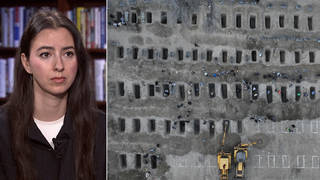
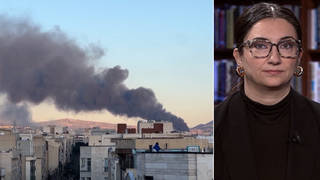
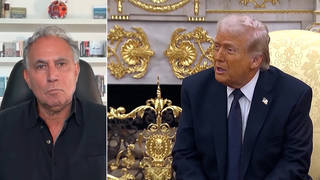
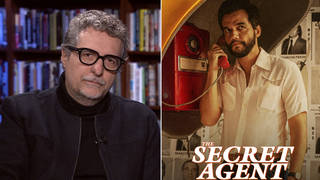


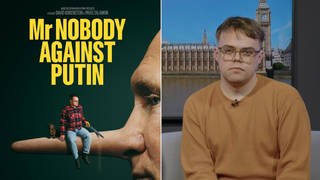


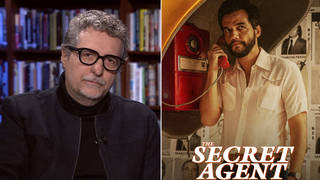
Media Options